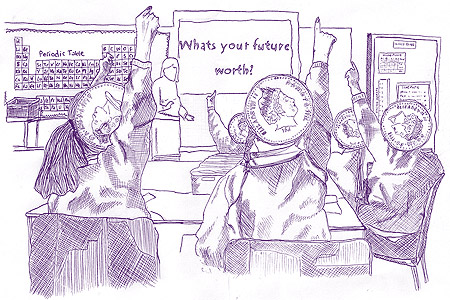
| HOME |
| NERVE |
| REVIEWS |
| ARCHIVE |
| EVENTS |
| LINKS |
| ABOUT US |
| CONTRIBUTORS |
| BACK ISSUES |
| CONTACT US |
Back to index of Nerve 20 - Summer 2012
The World My Classroom and Life is My Curriculum: Some Reflections on Home Education
 By
Anstey Gilley
By
Anstey Gilley
Image by Ami Turner
"Education... now seems to me perhaps the most authoritarian and dangerous of all the social inventions of mankind. It is the deepest foundation of the modern slave state, in which most people feel themselves to be nothing but producers, consumers, spectators, and 'fans', driven more and more, in all parts of their lives, by greed, envy, and fear. My concern is not to improve 'education' but to do away with it, to end the ugly and antihuman business of people-shaping and to allow and help people to shape themselves." John Holt (educator and a founder of the unschooling movement.)
People get into home education for a huge variety of reasons, for many it is an alien concept that they have never heard of let alone considered as a viable option for their child. But for many it is thrust upon them by the failures of the school system; the inherent problems of institutionalising children in a "one size fits all" or "factory model" school which will inevitably leave some children with their needs unmet and their precious childhood time wasted.
"Home ed gives you the time to love your kids individually, we had no time before, their lives were just flying by...I started this because I thought WE had a problem but taking them out of school has exposed that we were LIVING a problem." M, mother of five.
"They failed to help with his migraines. They said they couldn't treat him as an individual. Just wanted him on pills every day." L, mum of T, age 12.
Add bullying into the equation and you find that for many discovering home education is quite literally a life saver.
"My daughter was on the brink of suicide. If I hadn't taken her out she would have been one of those headlines, one of those statistics. It was bullying -'relational aggression' as they call it." H, mother of one.
"We have to succeed where the system has failed...He's now more confident, happier - his old self again. We were losing him. He had mentioned suicide. Teachers have no idea of the damage they can cause." P, dad of C, age 12.
But for others it is the positives of home education that draw us into it. The image of a "home schooled" child sitting at the kitchen table in isolation doing pages of sums watched over by an overbearing and anti-social parent still exists in the public imagination, but is very very far from the truth. Home educators find that it is the integration of learning into the everyday life of the family and the wider community that becomes so valuable. That informal learning becomes "a commonplace, unremarkable and yet astonishingly efficient way to learn." (How Children Learn at Home by Thomas and Pattison) That as parents our job is to be role models, facilitators and co-learners. Yes co-learners! Back to John Holt: "What children need is not new and better curriculum but access to more of the real world; plenty of time and space to think over their experiences, and to use fantasy and play to make meaning out of them."
Another common perception is that Home Education is a middle class phenomenon; in fact 42% of home educating families in the UK earn less than the national average and 17% live on incomes under £10,000 per annum. And recent ConDem changes to benefits are hitting single parent home educating families hard, as those on Lone Parent benefit now have to get back to work when their child is five (previously it was 12) and that age looks set to drop to three in the near future.
Talking to my friends on the Liverpool Home Education scene an overriding theme that comes across as important to us all is that of freedom. The freedom to let our children develop at their own pace, not according to someone else's timetable but according to their own abilities and interests. The freedom to take part in hands on, community based, spontaneous and real world experiences that would otherwise be missed if the children were packed off to school. The freedom, as many of the children I asked pointed out to me, to play. The freedom to put our family's individual needs or beliefs (whether religious or lifestyle) first.
For example, "It’s easier to be a global citizen when you home ed -you're not limited to a city or a building, you can take your education with you wherever you go. We are the 21st Century nomads!" T, mother of two.
And with an uncertain future ahead of us and so many challenges to be faced we need people who love to learn, whose natural curiosity and desire to learn has not been damaged or restricted by the anxieties of being judged (tested) or by their fear of failure (not making the grade) or by the system of punishment and reward, all of which reduce our ability to be self motivated learners.
I have to finish with Holt: "Learning is not the product of teaching. Learning is the product of the activity of learning." And "we should try to turn out people who love learning so much and learn so well that they will be able to learn whatever must be learned."
With thanks to all the children and parents of the Liverpool Home Education group.
Nerve would like to hear from our readers about their experiences and views on education and schooling.
For more info see these websites:
*www.education-otherwise.net
and
www.liverpool.gov.uk/schools-and-learning/home-education/